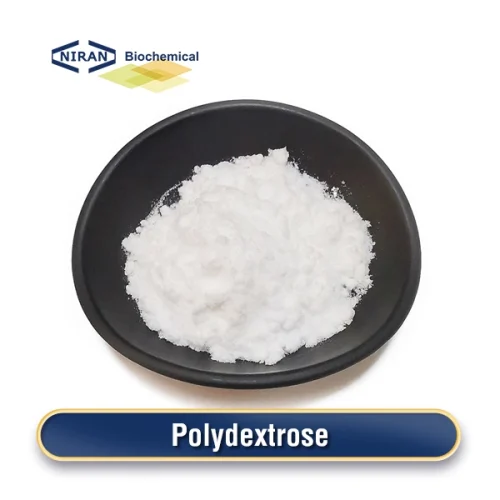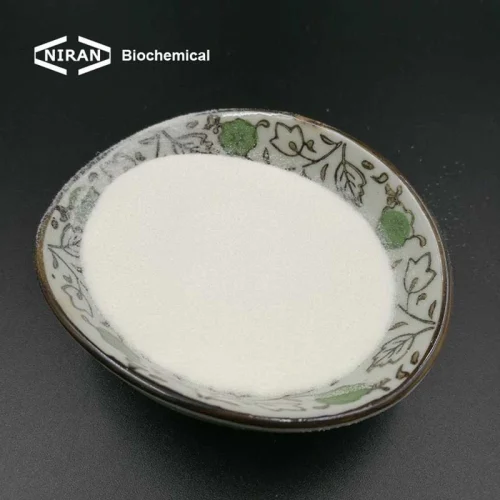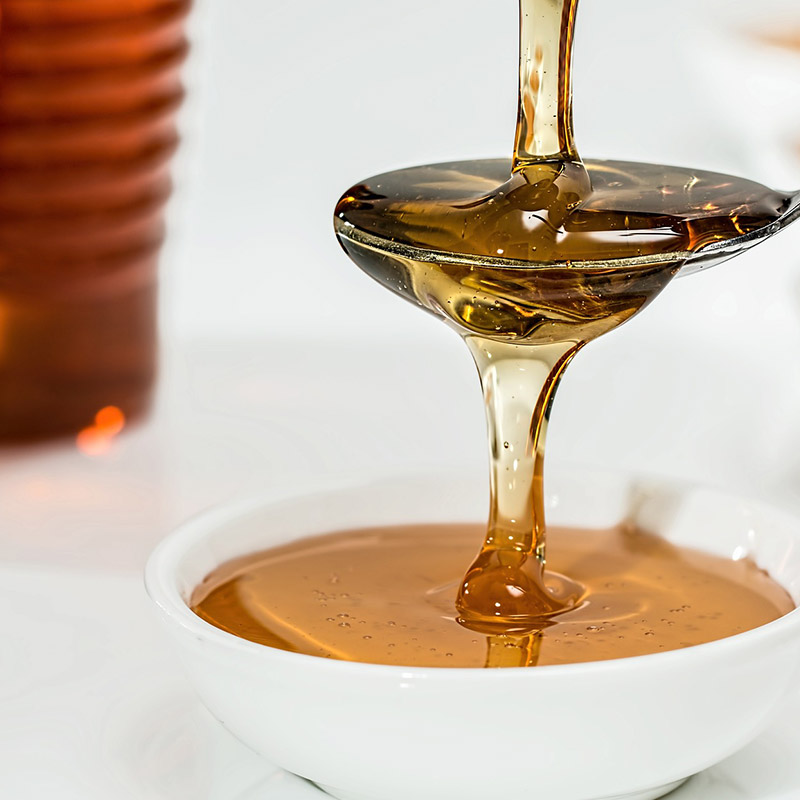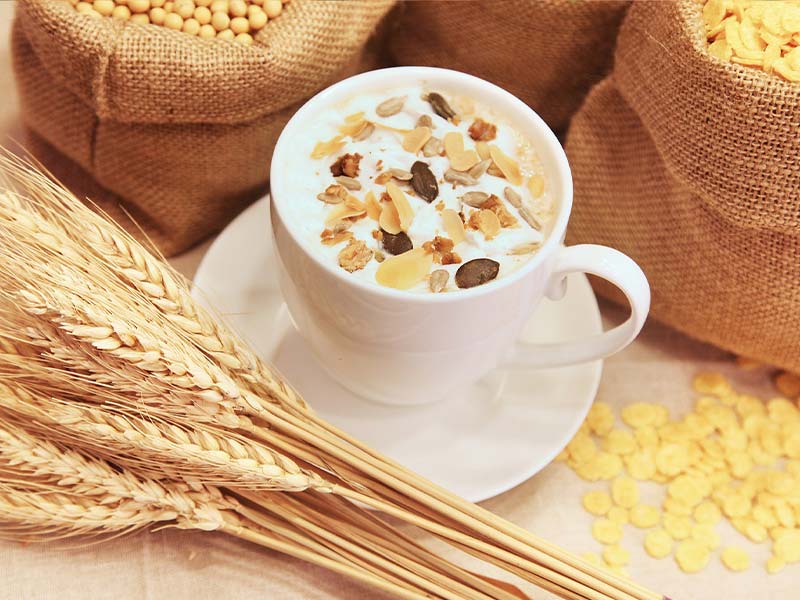POLYDEXTROSE Supplier
Polydextrose (E1200) is a soluble fiber frequently employed as a food ingredient.
It is a versatile ingredient that can be used to improve the nutritional profile, texture, and functionality of a wide range of food products, including baked goods, dairy products, beverages, confectionery, and nutritional bars.
NIRAN Biochemical offers high-quality polydextrose powder wholesale solutions to buyers.
If you are interested in food additive E1200, please contact us now.


Polydextrose (Food Grade)
- Formula: (C6H10O5)n, n represents the degree of polymerization, typically ranging from 10 to 20.
- CAS Number: 68424-04-4
- Appearance: White fine powder.
- Calories: Approximately 1 kcal per gram.
- Standard: USP
- Certifications: KOSHER, ISO, HALAL, FSSC22000, BRC, etc.
- Shelf life: 2 years
FUNCTIONS OF POLYDEXTROSE
Derived from the polymerization of dextrose (glucose), polydextrose stands out for its versatility and wide range of applications in the food industry. With its ability to act as a bulking agent, texture modifier, humectant, binding agent, and sugar replacement, polydextrose plays a crucial role in creating low-calorie, reduced-sugar, and fiber-enriched food products.

-
Bulking Agent
Polydextrose contributes bulk and volume to food items without substantially increasing calorie content, rendering it well-suited for crafting low-calorie and reduced-sugar food options. -
Texture Modifier
Polydextrose improves the texture and mouthfeel of food products, contributing to a smoother and creamier consistency. -
Humectant
Polydextrose helps maintain moisture in baked goods, preventing them from becoming dry and stale. -
Binding Agent
Poly-D-glucose helps bind ingredients together in food formulations, improving the overall structure and stability of the product. -
Sugar Replacement
It can replace sugar in food formulations, reducing the total sugar content while maintaining sweetness. -
Prebiotic Fiber
E1200, a food additive, serves as a prebiotic fiber, fostering the proliferation of beneficial gut bacteria and bolstering digestive well-being.
APPLICATIONS in Food Industry
Polydextrose hailed as a versatile and indispensable ingredient in the food industry, permeates a wide array of food and beverage applications, offering multifaceted benefits. From baked goods to beverages, and dairy products to confectionery items, Poly-D-glucose plays a pivotal role in enhancing texture, reducing sugar content, and fortifying fiber content while maintaining product integrity and sensory appeal.

- Baked Goods : It is used in baking to enhance the texture, moisture retention, and shelf life of bread, cakes, cookies, and pastries.
- Beverages: Polydextrose is incorporated into soft drinks, fruit juices, and sports beverages to enhance texture and decrease sugar levels.
- Dairy Products: It is used in yogurt, ice cream, and dairy desserts to enhance texture, reduce sugar content, and increase fiber content.
- Confectionery: Poly-D-glucose is used in candies, chocolates, and chewing gums to provide bulk, texture, and sweetness without adding calories.
- Nutritional Bars: In nutritional bars, polydextrose serves as both a binder and bulking agent, imparting texture and fiber without sacrificing flavor.

- Dressings and Sauces: Polydextrose is used in salad dressings, marinades, and sauces to improve texture and mouthfeel while reducing sugar and calorie content.
- Meal Replacement Shakes: This is added to meal replacement shakes to provide fiber, improve texture, and reduce sugar content.
- Cereal and Snack Bars: Food additive E1200 is used in cereal and snack bars to improve texture, increase fiber content, and reduce sugar content.
- Sugar-Free and Low-Calorie Foods: It is used in a wide range of sugar-free and low-calorie foods such as jams, jellies, puddings, and syrups to provide sweetness and bulk without adding calories.
- Medical Foods: Polydextrose is used in medical foods and dietary supplements to provide fiber and improve texture.
Maximum Usage(g/kg)
These maximum dosages are set to ensure that Polydextrose enhances the product without negatively impacting texture, flavor, or overall quality.

Beverages (10.0 g/kg)
The maximum dosage of 10.0 g/kg in beverages is designed to ensure that the product remains palatable, higher levels could lead to a noticeable impact on taste and sweetness balance, as well as potential digestive issues like bloating or gas.

Baked Goods (15.0 g/kg)
A higher maximum dosage of 15.0 g/kg is permissible in baked goods because the cooking process can reduce the impact of Polydextrose's bulk-forming properties. However, exceeding this limit could affect the texture and stability of the product.

Canned Fruit (5 g/kg)
A limit of 5 g/kg for canned fruit is imposed to ensure that the fruit maintains its natural flavor and texture. Exceeding this dosage could result in an overly sweet or artificial taste and potentially affect the fruit’s preservation and texture.

Dairy Products (12 g/kg)
Dairy products are allowed up to 12.0 g/kg of Polydextrose to balance sweetness and texture while maintaining the product's creamy consistency. Higher levels might disrupt the dairy’s natural mouthfeel and flavor profile, impacting consumer satisfaction.

Jam (6 g/kg)
For jam, the maximum dosage of 6.0 g/kg helps ensure that the texture and sweetness of the jam are appropriate and balanced. Excessive Polydextrose could alter the gel consistency and flavor, leading to an unsatisfactory product.

Salad Dressing (5 g/kg)
The limit of 5.0 g/kg in salad dressing is set to maintain a desirable texture and flavor profile. Excessive amounts could impact the dressing’s consistency and taste, making it less enjoyable for consumers.

Meat Marinades (8 g/kg)
The maximum dosage of 8 g/kg for meat marinades is set to prevent excessive sweetness or texture changes in the marinade. Higher concentrations might affect the marinade's effectiveness and the overall sensory characteristics of the meat.

Nutritional Supplements (8 g/kg)
Nutritional supplements have a maximum dosage of 8.0 g/kg to provide a beneficial amount of Polydextrose without causing digestive issues or affecting the supplement’s overall efficacy and taste.
